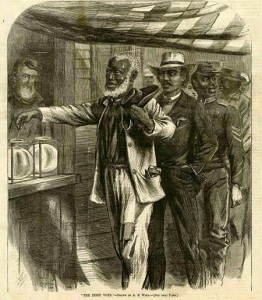New TSLA Exhibit Addresses “Emancipation and Reconstruction”
In November 1872, Tennessee voters elected their first African-American representative to the General Assembly. In all, 14 African Americans, most of them former slaves, were elected to the General Assembly between 1872 and 1896. These African-American legislators represent a significant part of Tennessee state history. They laid the groundwork for the later achievements of the Civil Rights Movement and the legacy of their tireless struggle for equality lives on today.
A new exhibit, with 16 panels full of images and information on this fascinating period in our history, opened last Thursday at the Tennessee State Library and Archives. The exhibit will continue through the month of August. The public is invited to explore the achievements of these 14 men, their legislative service, and the times in which they lived.
“Chaotic” scarcely describes conditions in the South during the period known as Reconstruction – the painful era during which the federal government attempted to reorganize and reform the South after the Civil War.
With emancipation came the hope of new opportunities for African Americans: the chance to get an education, the prospect of owning land, the right to vote, and even the opportunity to hold public office. However, with this hope came many challenges as blacks and whites struggled to find their place in this changing new world.
Three important amendments affecting African Americans were made to the U. S. Constitution during Reconstruction. The 13th Amendment (1865) abolished slavery. The 14th Amendment (1868) conferred citizenship and equal protection to the former slaves. The 15th Amendment (1870) was the most controversial because it gave all men, regardless of race, the right to vote (women were still excluded from voting). Since Tennessee had already extended the right to vote to African-American men, it rejected the 15th Amendment.
After some determined arm twisting by Tennessee’s Reconstruction governor William G. Brownlow, the General Assembly ratified the 14th Amendment in 1866 and endorsed statewide suffrage for African Americans a year later. In doing so, Brownlow also secured the African-American vote in his 1867 bid for reelection, and many African-American voters remained loyal to the Republicans for decades.
The State Library and Archives is located at 403 Seventh Avenue North, just west of the State Capitol building in downtown Nashville. The exhibit, free and open to all visitors, is located in the building’s lobby directly behind the main entrance.
The Tennessee State Library and Archives is open Tuesdays through Saturdays, from 8 a.m. until 4:30 p.m., with the exception of state holidays. Parking is available in front, behind and beside the building.













